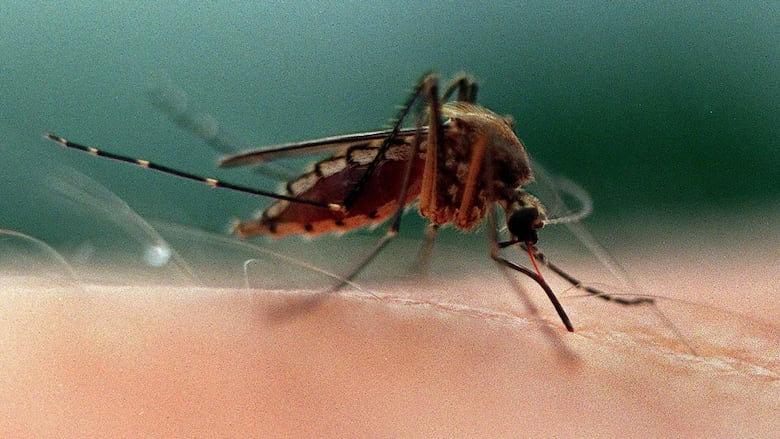Mosquito traps set and study launched in B.C.'s Sea-to-Sky region after illnesses reported
Officials say 4 cases of California serogroup viruses, causing brain swelling, reported in 2024

Mosquito traps have been set up across the Sea-to-Sky region in British Columbia as health officials launch a pilot project amid concerns of severe illness transmitted by the insects.
Vancouver Coastal Health (VCH) said Friday that there were four cases of mosquito-borne illnesses due to the California Serogroup viruses late last year, that resulted in swelling of the brain.
Dr. Moliehi Khaketla, medical health officer for VCH, said in an interview that the viruses aren't new to B.C., but it's unusual to see these "very severe" human cases.
"So, this prompted us to study further, just to see and better characterize what is happening within the Sea to Sky area," said Khaketla.
Officials are asking people to take precautions against mosquito bites in the region, as they warn that mosquito activity could increase in B.C. as the weather gets warmer due to climate change.
The health authority said those who have been in the Sea-to-Sky region and develop symptoms of severe headaches with fever or seizures are advised to seek care immediately.
As part of the monitoring study, traps have already been set up in the Sea-to-Sky region — along Howe Sound and north to Whistler and Pemberton — where officials say all the patients likely acquired the infections in the area.
The purpose of the traps is to understand the area's mosquitoes and the illnesses they spread.
Dr. Rohit Vijh, another VCH medical health officer, told CBC News that the traps were being set up at sites identified by local First Nations and environmental scientists, after input from the four patients who reported serious illness.
The health authority said the four patients have recovered from their illness.
The mosquito project will last for three months, and Vancouver Coastal Health said it wants to learn more about the risk to the public. In the meantime, those in the area should take preventive measures against mosquito bites, it said.
Measures to protect against bites include wearing protective clothing, and avoiding any stagnant water around backyards that can be pools for mosquito breeding, said Khaketla.
Khaketla said the purpose of the study is to help health officers learn more about the mosquito population within that corridor and understand what specific viruses that they are carrying.
"We wanted people to be aware of the mosquito circulation within the Sea to Sky area, as it is summer months, we expect mosquitoes to circulate."
The mosquito-borne illnesses that officials investigated, part of the so-called California Serogroup viruses, usually do not cause symptoms, but when they do occur, they are flu-like, with a fever, headache, fatigue, and occasional nausea or vomiting.
Climate change risk
Officials say the specific viruses that caused illness in the Sea-to-Sky region were the Snowshoe Hare virus and the Jamestown Canyon virus.
Vancouver Coastal Health said that, prior to this cluster of four cases, 10 cases associated with the two viruses were reported in B.C. since 2009, two of which were in the VCH region.
The health authority said in a statement that cases of mosquito-borne illnesses usually occur between May to October when there is increased mosquito activity, but this period may be extended due to "increasingly warmer temperatures" from climate change.

"As our temperatures rise, as well as the period of of increased heat becomes longer and there's more months, you will see more mosquito activity," Vijh said.
"The longer summers you have, the more likely more of those [mosquito] eggs will be produced and survive over the winter," he added.
Vancouver Coastal Health, the B.C. Centre for Disease Control, partners from the Lil'wat Nation and Squamish nations and the University of British Columbia will collaborate on the surveillance pilot project.
With files from the CBC's Akshay Kulkarni

